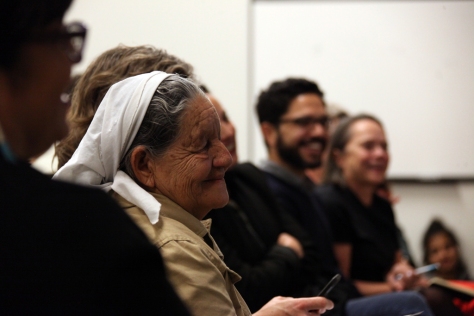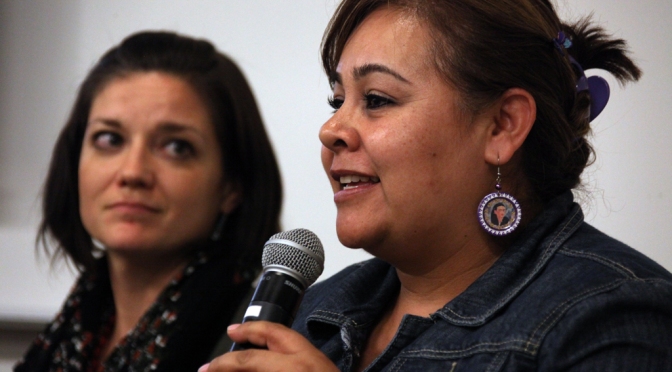Angela Markwith
Staff Writer
In the two weeks before Spring Break, USF hosted the 14th annual Global Women’s Rights Forum. The event, spread over the course of four evenings, was coordinated by Professor Dorothy Kidd, chair of the media studies department, and Professor Elizabeth Friedman of the politics department. Each evening was intended to pose interesting and relevant questions in relation to modern women’s rights, not only in the United States, but across the globe.
“Students can learn from academic and activist experts about issues that concern us all, and can hear about alternate explanations for these issues from people in places outside the university, and outside the U.S., topics, and subjects often not covered in their courses,” said Kidd.
The first event “Feminist Art In Movement,” featured a performance from the Sarah Bush Dance Project, a contemporary dance group based in Oakland that focuses on pertinent social issues. Dancers for the project come together to show femininity and womanhood in a unifying and liberating manner.
“There continue to be important issues that affect women, including violence, poverty, misrepresentation in media and popular culture, immigration, etc., and most of these issues have global footprints,” stated Kidd.
On Thursday, Mar. 5, the second night of the forum focused on “Endangering Immigration Justice” during which Latina women spoke about the trials of immigration from the perspective of a woman. The evening also intended to show how women are organizing to achieve more just and humane immigration politics.

It began with a completely packed room of eager listeners ready to hear from the first speaker Professor Maylei Blackwell from UCLA, a scholar, activist, oral historian, and author of ¡Chicana Power! Contested Histories of Feminism in the Chicano Movement. Professor Blackwell’s research covers similarities and differences of Mexican and American women’s social movements, and how they are shaped by questions of difference factors such as race, indigeneity, class, sexuality and citizenship status.
She discussed how these differences impact the possibilities and challenges of transnational organizing.“When women step out of their prescribed rules to speak in public and take public space, they are often seen as gender deviants and many activists complain about this or challenge this.”
She also spoke about the impact of civil organization, and how powerful of a tool it can be for women. “Organizing shows us how to move forward as women and how to not to be submissive in front of other men,” she said.
Following Professor Blackwell was the Mujeres Unidas y Activas (MUA). The MUA is an organization of Latina immigrant women with the mission of promoting personal transformation and building community power for social and economic justice.
MUA member Enma Delgado was the first to speak from the group. She addressed the audience in Spanish and spoke about the adversity that she faced as a Latin American woman. “I had to come to America and leave my country in order to create a better life for my children,” stated Delgado. Although her words had to be translated by the translator on stage with her, the pain that she once felt was portrayed by her body language and facial expressions.
Following Delgado, Maria Hernandez, MUA Immigrant Rights Organizer, spoke with empowering emotion that moved the audience. As a victim of sexual assault and abuse, Hernandez allowed her tears to flow as she spoke about her life experiences and how far she has come.
The evening ended with a Q&A session where students were able to ask questions of the panelists or make comments about what they heard. Delgado was the first to answer a question, and described leaving her children in El Salvador in order to work in the United States. She explained their “little hands” waving at her as she watched them from the back window of the car that would take her from her native country. The woman translating Delgado’s story paused to collect herself, as she could not retell the story without crying herself, and many audience members cried in solidarity with Delgado’s pain.
Thursday night’s prevalent theme of female empowerment continued to be a powerful theme throughout the rest of the forum’s events. On Monday Mar. 9, the forum focused on how women are navigating the Internet, using technology to deal with online violence and harassment while reclaiming the technology for themselves and communities.
The two panelists that night were Jac sm Kee and Rose Aguilar. Kee is a feminist activist and writer, and is the Manager of the Association for Progressive Communications Women’s Rights Programme. Her areas of focus include internet governance, human rights and freedoms, sexuality, women’s rights, violence against women and the creative and strategic use of communications technologies for movement building and inclusive political engagement.
Aguilar hosts Your Call, a public affairs radio show on KALW 91.7 FM. She is the founder of the Use Your Voice workshop series, is working on a new book about older women activists, and is preparing to launch a new radio show about investigative journalism. Her experience prompted her to host the conversation-style evening, and dialogue flowed in a manner similar to a radio interview.
Tuesday night’s forum discussed the topic of sexual assault on campus. Survivors, student-leaders, journalists and leading academics discussed in a panel one of the most pressing campus issues of our time: sexual assault. This program was developed with the support of the USF Office of Student Conduct, Rights & Responsibilities and from students who expressed their own thoughts or ideas on sexual assault through spoken word.
Panelists Sofia Karasek, Aryle Butler, Danielle Dirks, and Jenna Recupero all spoke about topics of sexual assault, human trafficking, justice, and empowered not only women, but all victims to stand up and put an end to sexual violence.
The Global Women Rights Forum is USF’s way of acknowledging women’s rights and empowering all women to come together as a strong entity to establish justice and equality. “The Global Women’s Rights Forum exists to highlight these issues, bring together women activists and academics, and spark a conversation for us at USF,” said Kidd.
Photo credit: Kristian George/Foghorn

